
Figure 1: Baines, Jackie, Edward A. S. Ross, Jacinta Hunter, Fleur McRitchie Pratt, and Nisha Patel. Digital Tools for Learning Ancient Greek and Latin and Guiding Phrases for Using Generative AI in Ancient Language Study. V2. March 12, 2024. Archived by figshare. http://dx.doi.org/10.6084/m9.figshare.25391782.v2.
Over the past year, Jackie Baines and Edward A. S. Ross have been researching the ethics of generative AI in teaching Classics and ancient languages as part of their Teaching and Learning Enhancement Project (TLEP) “ChatGPT: A Conversational Language Study Tool.” Their work on this project has initially led to the Classics Department’s AI guidelines and citation guide, and now Jackie and Edward have produced a guiding phrases document and aseries of tutorial videos for staff and students about ethical and effective uses for generative AI.
The guiding phrases document is a compilation of digital learning tools, including generative AI tools, for learning Ancient Greek and Latin. With the help of undergraduate students Jacinta Hunter, Fleur McRitchie Pratt, and Nisha Patel, the Classics AI Testers for the project, Edward and Jackie prepared and tested 10 “copy-paste”-able prompts to streamline generative AI use for supporting ancient language learning. These guiding phrases are tailored for students of elementary, intermediate, and advanced Ancient Greek and Latin at the University of Reading, but they are also couched with tutorials on how to customize them for a more personalized experience.
In order to increase generative AI literacy and make current guidelines more accessible, Jackie and Edward have also prepared a number of tutorial videos about the ethics of using generative AI and proper methods for using these tools. A playlist of these videos is available here.
Alongside these videos, Edward and Jackie will be hosting a Continuing Professional Development (CPD) workshop on methods for using a variety of generative AI tools to support ancient language teaching and for introducing generative AI ethics to students (Figure 3). This event is funded by a Council of University Classics Department (CUCD) Education Grant and is completely free to attend. There are also some travel grants available for local teachers intending to participate in-person. Please email Jackie Baines (j.baines@reading.ac.uk) if you are interested in a grant. If you are interested in attending, please sign up for in-person or online attendance here.
Jackie and Edward have also surveyed staff and students in the Classics Department over the past year about the impact of generative AI on their studies. The results of the initial surveys will be published in the Journal of Classics Teaching shortly. The results of the second set of surveys will be presented at the Digital Humanities and AI conference.
The next stage of their research, now funded with an Undergraduate Research Opportunities Programme (UROP) grant, will focus on the biases present in generative image AI, specifically those related to the ancient world. The pilot study for this part of the project was completed by undergraduate student Shona Carter-Griffiths, and we are currently hiring a second-year undergraduate student to continue this work over Summer 2024 (Figure 4). If you are interested in applying for this role, please find the full details and application requirements here.

Figure 4: Gerard Butler with a Spear: Locating Modern Stereotypes for the Classical World in Generative Image AI









